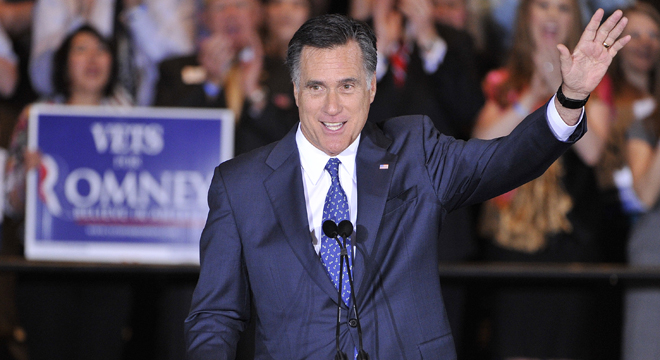Call it the “I’m rubber, you’re glue” election.
Running President Bush’s campaigns, Karl Rove became famous for taking his opponent’s single biggest strength and turning it into his biggest weakness. Mitt Romney is laying out another approach: taking his own top vulnerabilities and projecting them onto his opponent.
As Romney begins to settle into the role of presumptive nominee, he is deploying the strategy more and more. On Wednesday, Romney addressed the Newspaper Association of America in Washington, D.C. only a day after President Obama spoke there, delivering his his toughest speech yet. Obama targeted Romney and the House GOP with a slew of attacks that will likely help define the general election.
The contrast between the two speeches was striking. Name an accusation Obama and Democrats have used against Romney, and chances are you heard the same charge leveled against Obama in Romney’s speech.
The most obvious: flip-flopping. Ever since Romney recast himself as a conservative, pro-life Republican for his 2008 presidential run after previously cultivating an image as a moderate blue-state governor, it’s been his most persistent vulnerability. Romney’s dealt with this in 2012 partly by presenting proposals so vague as to be impossible to judge by either side, most notably a giant tax-cut plan that doesn’t include how it will be paid for and a subsidized voucher plan for Medicare that doesn’t say how large the subsidies will be. Romney explicitly said he avoided fleshing out his proposals because doing so makes them vulnerable to political attack, a lesson he said he learned after calling for the elimination of the Department of Education in his failed 1994 race against Sen. Ted Kennedy.
Obama mentioned this dynamic in his speech, without naming Romney specifically, saying that the GOP was trying to conceal the scale of their proposed budget cuts by not naming which programs would be affected.
“You can anticipate Republicans may say, ‘Well, we’ll avoid some of these cuts’ — since they don’t specify exactly the cuts that they would make,” Obama said. “But they can only avoid some of these cuts if they cut even deeper in other areas. This is math.”
Romney’s opening attack against Obama the next day: He’s a flip-flopper in waiting who won’t release his true plans for political reasons. He led off with a lengthy accusation that the president’s “hot mic” remark to Russian President Dmitry Medvedev that he’ll have more “flexibility” to negotiate an arms deal after the election proves he can’t be trusted.
“He is intent on hiding,” Romney said. “You and I will have to do the seeking.”
Romney applied the same logic to Obama’s economic agenda.
“Unlike President Obama, you don’t have to wait until after the election to find out what I believe in — or what my plans are,” Romney said. “I have a pro-growth agenda that will get our economy back on track — and get Americans back to work.”
Romney took a similar tack in rebutting one of the most prominent charges Obama lobbed at the House GOP’s budget on Wednesday, which Romney strongly supports despite offering his own alternatives, regarding Medicare. Obama accused Republicans of dramatically reducing seniors’ Medicare benefits over time in order to reduce the deficit — Democrats’ most crucial objection to the Ryan plan in general.
“The only reason the government will save any money — it won’t be on our books — is because we’ve shifted it to seniors,” Obama said. “They’ll bear more of the costs themselves. It’s a bad idea, and it will ultimately end Medicare as we know it.”
Romney responded in kind. He began by repeating his claim that Obama
“doesn’t have” a plan to make Medicare spending sustainable, then pivoted to accuse Obama of…enacting a plan to cut Medicare in order to make its spending more sustainable.
“In over three years, he has failed to enact or even propose a serious plan to solve our entitlement crisis,” Romney said. “Instead, he has taken a series of steps that end Medicare as we know it.”
Then almost immediately afterwards Romney cited the Affordable Care Act’s provisions aimed at controlling Medicare spending as a negative: “To control Medicare costs, he has created an unelected, unaccountable panel with the power to prevent Medicare from providing certain treatments,” Romney said. He also criticized Obama for trimming $500 billion from Medicare Advantage over the next decade — even as the Ryan budget he support contains the exact same cuts.
The “I know you are, but what am I?” dynamic is clear, if contradictory. Obama says I won’t lay out my real plans for Medicare cuts? Obama won’t lay out his plan. Obama says I want to end Medicare? Obama wants to end Medicare.
Even in his choice of stock phrases, Romney has raised eyebrows in recent days for using his opponent’s favorite lines. Twice in his Tuesday night victory speech in Wisconsin, he referred to Obama as “out of touch,” re-appropriating what is easily Democrats’ favorite descriptor for Romney in myriad press releases accusing him of being too wealthy and removed from average Americans to understand their problems.
The question now is whether Romney’s ju jitsu will insulate him from future hits on his well-established reputation for political opportunism — or merely serve to highlight his problems further.






